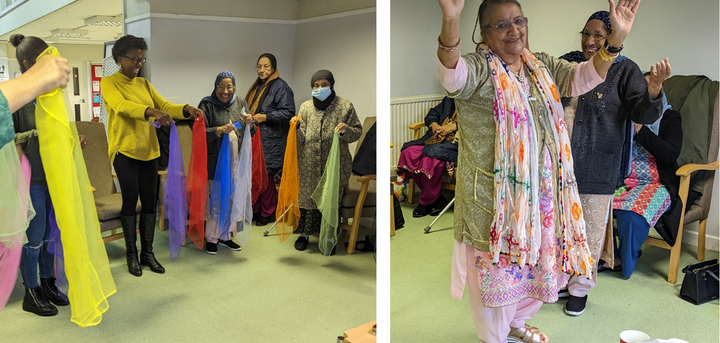An update from the Wazee Wellbeing groups

Published on 15 December 2022 02:22 PM
Through Healthier Together’s Ageing Well fund, Age UK Bristol has been working in partnership with Nilaari, a Black, Asian and Minority Ethnic (BAME) led charity to deliver group well-being sessions for BAME community groups in Bristol and South Gloucestershire.
The Wazee Wellbeing project, Wazee meaning ‘Elders’ in Swahili, visit established groups in these areas and runs culturally sensitive sessions tailored to meet the needs of individual groups. A variety of topics are covered, including managing anxiety, self-care, sleep hygiene, coping with loss and advice on how to stay well.
One group that Nilaari have been visiting on a regular basis is the Dhek Bhal Ladies Group, of which Krishna is a long-standing member.
Krishna volunteered for many years at the group but in recent years has joined as a member. She describes the weekly ladies group as being “like family” as all the women check in with each other at the start of a session and support each other with any health or family issues. They’ll have a little “gossip” she says and then take part in an activity which could be anything from yoga to first aid before having lunch together.
Krishna says that she has enjoyed Nilaari’s visits because the staff, Adetoun and Janice, have made an effort to get to know them all individually. Krishna appreciated that Adetoun and Janice had remembered about her recent trip to the hospital and asked her how her operation had gone. “They are very respectful, friendly and nice to speak to,” Krishna said. Krishna has particularly enjoyed the sessions that have involved music. “We sing a song, have a dance. Sometimes they bring drums and we all have a nice time.”
Shela is the group coordinator and says that the sessions are good for the women, providing something new that they can enjoy together. Some of the women who attend the group speak fluent English but the majority use Punjabi. Shela helps to translate when needed, but the sessions Nilaari run use straightforward, accessible English that most of the women can follow. Shela translated for one woman who said that she has taken what she has learnt from Nilaari home to teach her family too.
